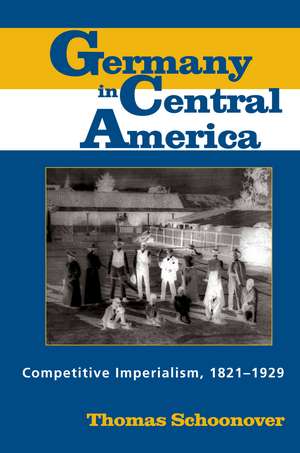Germany in Central America: Competitive Imperialism, 1821-1929
Autor Dr. Thomas Schoonoveren Limba Engleză Paperback – 31 oct 2012
Analyzes the German role in Central American domestic and international relations
Using previously untapped resources including private collections, the records of cultural institutions, and federal and state government archives, Schoonover analyzes the German role in Central American domestic and international relations.Of the four countries most active in independent Central America-Britain, the United States, France, and Germany- historians know the least about the full extent of the involvement of the Germans.
German colonial expansion was based on its position as an industrialized state seeking economic well-being and security in a growing world market. German leaders were quick to recognize that ties to the cheap labor of overseas countries could compensate for some of the costs and burdens of conceding material and social privileges to their domestic labor force. The Central American societies possessed limited resource bases; smaller and poorly educated populations; and less capital, communications, and technological development than Germany. They saw the borrowing of development as a key to their social, economic, and political progress. Wary Central American leaders also saw the influx of German industrialists as assurance against excessive U.S. presence in their political economies and cultures.
Although the simplistic bargain to trade economic development for cheap labor appeared to succeed in the short term, complex issues of German domestic unemployment and social disorder filtered to Central American countries and added to their own burdens. By 1929, Germany had recovered most of its pre-World War I economic position.
Using previously untapped resources including private collections, the records of cultural institutions, and federal and state government archives, Schoonover analyzes the German role in Central American domestic and international relations.Of the four countries most active in independent Central America-Britain, the United States, France, and Germany- historians know the least about the full extent of the involvement of the Germans.
German colonial expansion was based on its position as an industrialized state seeking economic well-being and security in a growing world market. German leaders were quick to recognize that ties to the cheap labor of overseas countries could compensate for some of the costs and burdens of conceding material and social privileges to their domestic labor force. The Central American societies possessed limited resource bases; smaller and poorly educated populations; and less capital, communications, and technological development than Germany. They saw the borrowing of development as a key to their social, economic, and political progress. Wary Central American leaders also saw the influx of German industrialists as assurance against excessive U.S. presence in their political economies and cultures.
Although the simplistic bargain to trade economic development for cheap labor appeared to succeed in the short term, complex issues of German domestic unemployment and social disorder filtered to Central American countries and added to their own burdens. By 1929, Germany had recovered most of its pre-World War I economic position.
Preț: 334.82 lei
Nou
Puncte Express: 502
Preț estimativ în valută:
64.07€ • 68.51$ • 53.42£
64.07€ • 68.51$ • 53.42£
Carte tipărită la comandă
Livrare economică 17-23 aprilie
Preluare comenzi: 021 569.72.76
Specificații
ISBN-13: 9780817354138
ISBN-10: 0817354131
Pagini: 334
Ilustrații: 12 Illustrations, 11 Tables, 2 Maps
Dimensiuni: 152 x 229 x 28 mm
Greutate: 0.52 kg
Ediția:First Edition, First Edition
Editura: University Of Alabama Press
Colecția University Alabama Press
ISBN-10: 0817354131
Pagini: 334
Ilustrații: 12 Illustrations, 11 Tables, 2 Maps
Dimensiuni: 152 x 229 x 28 mm
Greutate: 0.52 kg
Ediția:First Edition, First Edition
Editura: University Of Alabama Press
Colecția University Alabama Press
Notă biografică
Thomas Schoonover is a professor in the History Department at the University of Louisiana at Lafayette.
Descriere
Analyzes the German role in Central American domestic and international relations
